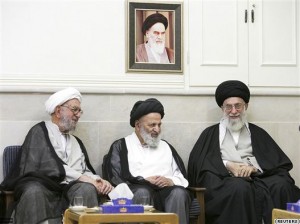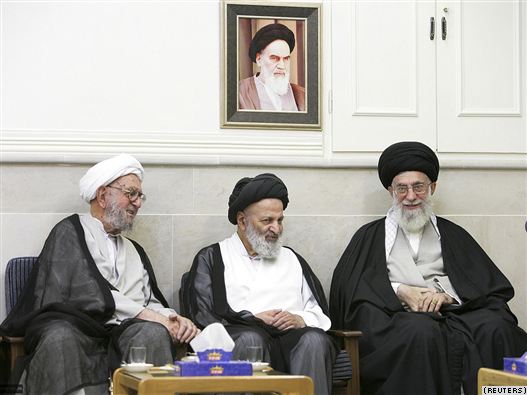RFE/RL | November 13, 2010
by Golnaz Esfandiari

Supreme Leader Ayatollah Ali Khamenei, right, at a meeting with top clerics in the holy Shi'ite city of Qom.
One of the casualties of the 2009 Iranian presidential election was the seriously damaged legitimacy of the country’s Supreme Leader Ayatollah Khamenei, resulting from his endorsement of the vote amid allegations of massive fraud. His recent visit to Qom was widely seen as an attempt to regain legitimacy, strengthen his authority, and demonstrate that he is popular through the regime’s propaganda machine.
Since last year, some analysts and others have been questioning the reasons for Khamenei’s support of Iranian President Mahmud Ahmadinejad, who many believes came to power in 2005 due to Khamenei’s backing and whose highly disputed reelection in 2009 was sealed with Khamenei’s approval.
Hojatoleslam Eslamian, a member of the Society of Seminary Teachers of Qom who met with Khamenei during his recent trip to Qom, said in an interview with the semi-official Fars news agency that Khamenei told the members of the conservative group that Ahmadinejad has not been striving to create a “parallel administration” and added that the country’s current politicians speak “the language of the establishment and the language of the revolution.”
Eslamian quoted Khamenei as saying:
“In the past the enemy spoke like this, and some people tried to create such a situation in the country, where the government and the parliament are opposed to the Velayat Faghih [rule of the Supreme Leader], which is the center of the government. But this is not the case now.”
According to Eslamian’s account, Khamenei added:
“In the current situation there are differences of opinion, and I don’t agree with some issues. But now when the Supreme Leader says something, the president accepts it and acts accordingly. “
Read the full article in Radio Free Europe / Radio Liberty. >>

